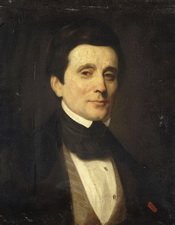(1791-1871)
Émile Deschamps was a French poet and dramatist. He made his début in 1812 with his poem La paix conquise, which caught even Napoleon's notice. He was a regular visitor to the “Cénacle” literary gatherings organised by Charles Nodier, which Alphonse de Lamartine also sometimes attended. Later on, he would also join the salons of Victor Hugo and Marie d'Agoult, where Liszt, Chopin, Ferdinand Hiller and Mariel Pleyel displayed their piano skills.
He created a revised libretto on the Don Giovanni theme and also reworked the prose text Berlioz had written for his symphony Roméo et Juliette into verse form and worked on the librettos for the operas of Meyerbeer (including Les Huguenots, making many parts more singable). In addition, he crafted librettos for Daniel Auber, Bellini, Halévy and Rossini, as well as for less important composers like Louis Niedermeyer and Amédée de Beauplan, and also wrote poems for songs and cantatas and translated text from English, German and Italian, including almost 50 of Schubert's song.
In 1824, he and Victor Hugo together launched a literary-artistic journal titled La Muse française, which published his poems and stories.
As a music critic, he championed the Italian bel canto style represented first and foremost by Rossini. In his view, ballet interludes and spectacular stage designs diverged from the true aim of opera. Nevertheless, it was partly through his influence that the Romantic movement made inroads into French opera.
Émile Deschamps was a French poet and dramatist. He made his début in 1812 with his poem La paix conquise, which caught even Napoleon's notice. He was a regular visitor to the “Cénacle” literary gatherings organised by Charles Nodier, which Alphonse de Lamartine also sometimes attended. Later on, he would also join the salons of Victor Hugo and Marie d'Agoult, where Liszt, Chopin, Ferdinand Hiller and Mariel Pleyel displayed their piano skills.
He created a revised libretto on the Don Giovanni theme and also reworked the prose text Berlioz had written for his symphony Roméo et Juliette into verse form and worked on the librettos for the operas of Meyerbeer (including Les Huguenots, making many parts more singable). In addition, he crafted librettos for Daniel Auber, Bellini, Halévy and Rossini, as well as for less important composers like Louis Niedermeyer and Amédée de Beauplan, and also wrote poems for songs and cantatas and translated text from English, German and Italian, including almost 50 of Schubert's song.
In 1824, he and Victor Hugo together launched a literary-artistic journal titled La Muse française, which published his poems and stories.
As a music critic, he championed the Italian bel canto style represented first and foremost by Rossini. In his view, ballet interludes and spectacular stage designs diverged from the true aim of opera. Nevertheless, it was partly through his influence that the Romantic movement made inroads into French opera.
